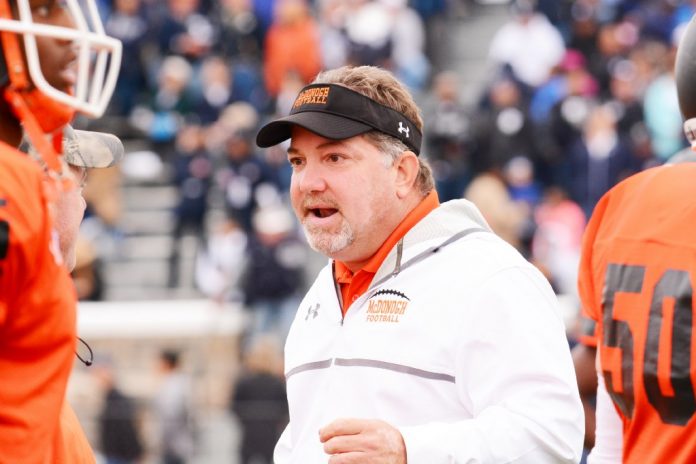The former Northeast Philadelphia coach remembers his roots.
Dominic Damico was far ahead of his time.
Today, just about every high school football team comes out with multiple receivers. Quarterbacks throw the ball all over the field. The spread offense is one of the most common offenses you’ll see at the high school level.
That’s today.
In the 1990s, most high school teams, particularly in the Catholic League, would run on first down, run on second down and, if possible, run on third down. Most teams passed only when the situation was dire.
But not Damico. Not his Cardinal Dougherty High School football team, which he coached from 1990 to 1993. The Cardinals used a run-and-shoot offense that included a lot of shooting and not a whole heck of a lot of running.
“We did it because we were playing against much bigger schools, and we had to find a way to compete,” said Damico, who guided Dougherty to the Catholic League Northern Division finals during his final year as coach. “The offense was a quirky, new idea that leveled the playing field. I learned parts of it from the coaching staff at Maryland, which was using the offense on the ground floor. It’s a good offense.”
Damico still uses parts of the offense and he’s even more successful than he was at Dougherty. He’s coaching at McDonogh School, a private academy in Owings Mill, Md. He’s been the head man there since he left Dougherty in 1994.
Fun fact: Damico was replaced by Archbishop Ryan’s Glen Galeone as football coach and athletic director at Dougherty, but he quit and returned to Ryan shortly before training camp began. Paul Hackney, who was the coach of the Cardinals freshman team, ended up as Dougherty’s coach.
Along with his brother Mike, who has been his assistant since his days at Dougherty, Damico has built quite a program.
McDonogh is ranked №2 in the state. The team has had a lot of success, locally, this year, handing La Salle its only loss of the season and also besting Inter-Ac powerhouse Malvern Prep.
Damico, who graduated from North Catholic and played and coached at Temple, makes it a point to return home as much as possible.
“It works out great because we like to play a schedule with top teams and that allows us to do that,” Damico said. “We play a schedule with very good teams like DeMatha, Gonzaga and Archbishop Spalding. These are some of the best teams in the nation, and we have a program that competes with them.”
Damico has built quite the program at McDonogh, but he’s also happy about everything he’s accomplished away from football.
His daughter, Dominique, attended the school. She now has two sons, Dominic, 4, and Cassius, 1. Damico doesn’t know if he’ll be coaching his grandsons in football, but he sees them going to his school.
“It’s such a small school, and it offers a great education,” Damico said. “The boys love coming to the games, they like to be around and see Pop Pop D and seeing the (players). As for football? I’d say if football is the best avenue for them to get an education, then they’ll play.
“Coaching here has opened up a lot of opportunities. My daughter went to a great school, and with the connections I’ve made here, my nieces and nephews were able to go to great schools. It’s opened up a lot of doors, and it’s nice to see the kids get that kind of opportunity. McDonogh is a great school.”
It’s also a great football program.
Because it’s a small school, the team isn’t massive. There are 47 players on the roster. But there are a lot of talented players on that team.
According to Damico, there are about five Division I players on his roster. During his days at Dougherty, he had his share of Division I athletes — Troy Kersey and Tom Indio went to Temple, John Waerig went to Wisconsin and Maryland and Imani Bell ended up at Penn State — but at McDonogh, the top-flight players are more plentiful.
“This year, we have a great quarterback who can run and throw,” Damico said. “We don’t use the same offense we did at Dougherty, it’s about 20 percent of that, but we do a lot of different things.”
Damico isn’t the same coach he was when he was at Dougherty.
Sure, he has the same passion, he’s always trying to come up with a new wrinkle, and along with his six assistants, his focus is on building a winner. But he has grown as a teacher and a mentor.
“I don’t get as upset when we lose now,” Damico said. “I think as you get older, you learn to get over it faster. It still upsets me, but not as much as it did when I was younger. Now, you think about it for maybe a day, but then you move on.”
He can let go of the losses, but he’ll never let go of the relationships he’s made while coaching.
Damico still keeps in touch with many of the men he coached while at Dougherty. In fact, two years ago when he made a trip to Philly, about 10 of his former players took in the game.
He may be in Maryland, but a large part of him is still in Philadelphia.
“Social media is great, I love when players reach out and talk football or just to show me pictures of their kids,” said Damico, who grew up in Fishtown. “The kids at Dougherty were special. The relationships I made with the Philly kids is very unique. Philly is unique. McDonogh is a special place, but so is Philadelphia. I was blessed to coach at both places.” ••






